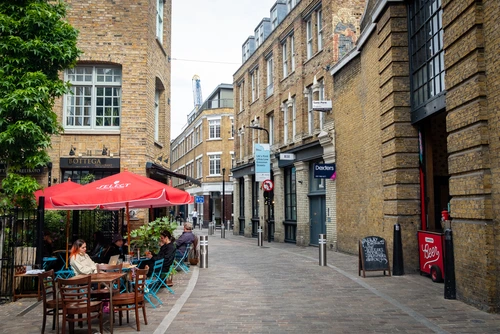
The term ‘gentrification’ itself is vague , but is generally used to signal wealthy newcomers displacing existing residents in up-and-coming neighbourhoods – with unhappy connotations of spiralling house prices, and poor residents being shunted out to make way for wealthy tech workers, expensive burger joints and cereal cafes.

At least, that’s the conventional narrative of countless articles and editorials fretting about the impact of gentrification in cities such as London, Brighton and Bristol. However, when we take a step back from the hand-wringing, it’s clear that the debate around gentrification is a lot more complicated than a simple battle between plucky communities and greedy gentrifiers.
The problem with this perspective is it fails to recognise that the roles and functions of urban neighbourhoods within a city have always changed over time. London’s Shoreditch incarnation as a tech hub is just one example of a long line of “disruptive newcomers” coming to the area, dating back to the arrival of the Huguenots in the 17th century. This dynamic is inherent and critical to making and sustaining successful cities, which have an economic imperative to welcome and make the best use of new people and businesses.
Another factor that many critics fail to recognise is that gentrifying businesses can play a big role in raising prosperity and wages for everyone in a city, not just those they directly employ. The economist Enrico Moretti has shown, for example, that US cities that had a boom in “new work” jobs (such as those in digital or creative firms) also enjoyed a boost in wages and employment in other sectors – benefiting people working in restaurants, retail, marketing and legal firms, and hotels and laundrettes.
This trend can also be seen in the UK. Centre for Cities research shows that places that are home to the highest concentrations of small businesses in “new work” sectors are also among the most successful places in terms of overall job growth and wages.
Rather than attempting to preserve places like Shoreditch as they were, the focus should therefore be on making sure that people already living there can also enjoy the benefit of the changes. That means, for example, taking steps to improve education and skills levels among local residents, to help them to capitalise on the new opportunities that change in their area might offer.
Of course, no would one deny that the rise in housing costs in places like London and Bristol poses major problems that urgently need to be addressed. But doing so won’t be possible unless we puncture the myth that creative in-comers are to blame when the biggest cause is in fact poor city management.
The most successful cities in the UK are also the least affordable to live in or to rent workspace in, primarily because of the scarcity of available land in these places, and the competing pressures for both housing and commercial usage. As a result, the development of new homes and workspaces is nowhere near the level it should be to match demand.
Local gentrification
The onus is therefore on local leaders in places like London to bring more land to market. That would enable more homes to be built, lowering costs for existing residents, and freeing up space in central urban areas for commercial use – allowing more new people and businesses to work, create jobs and contribute to the city.
The problem is that the planning system as it stands doesn’t give decision-makers enough incentives to address these challenges. The councillors who authorise local plans will inevitably respond to the views of those who vote them in – local residents – who tend not to welcome new developments being built in their neighbourhoods.
Policy responses to these problems have so far been inadequate. That urgently needs to change, especially in an increasingly globalised world in which the pace of change and disruption in our communities is only likely to increase.
One answer would be to give local leaders more powers over tax revenue generated in their areas, including stamp duty, which would give them the incentives they need to tackle housing shortages and other issues.
But ultimately, we also need to recognise the real roots of the problems that thriving urban economies face, rather than simply pointing the finger at the people and businesses which are driving that success. Failing to do so will result in places like London becoming so unaffordable they will stagnate – and as the late, great urban activist Jane Jacobs warned, when a place gets boring, even the rich people leave.
[Read more: What makes a city feminist?]






